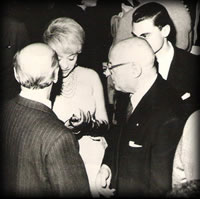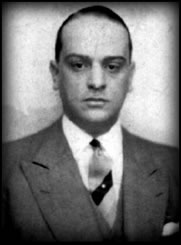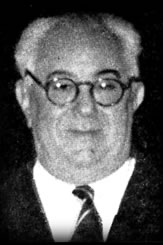By
Gardel's former partner, in a subdued light

oday I find clear that my premature excursions in the night of Buenos Aires, always guided by my uncle's Alejandro Berruti's tracker, afforded me surprising encounters. Not only for the background that those figures displayed but also, because of the chronological abyss. I expected with avidity to come across sacred monsters that I already knew for their remote fame.
 An autumn night, I suppose that in the mid- 50s —I would have been 15 or 16 years old—, when passing by the tearoom on Corrientes and Paraná, today the Premiere and I think that then too, from a table located on the shopwindow looking to Paraná, two gentlemen called my uncle. As by that time that local was coquettish, dark and with a secretive atmosphere, Alejandro looked at me and hesitated, but we entered.
An autumn night, I suppose that in the mid- 50s —I would have been 15 or 16 years old—, when passing by the tearoom on Corrientes and Paraná, today the Premiere and I think that then too, from a table located on the shopwindow looking to Paraná, two gentlemen called my uncle. As by that time that local was coquettish, dark and with a secretive atmosphere, Alejandro looked at me and hesitated, but we entered.
After the classic «my nephew» we sat with them. When he introduced them to me, I felt, somehow, I was a lucky man. The one who seemed older, faultlessly dressed in dark suit, white silk shirt, a necktie of a fitting color with red spots and the never-missing pin that, in this case, had a small ruby, somewhat fat, with a big double chin, completely white haired and very cordial, was José Razzano. Yes, Gardel's partner. I was breathless. I think I had the idea he was dead long ago. Talkative and with a visible Buenos Aires experience, he was having a good time with my stupor and was studying me thoroughly.
The other, more taciturn, equally impeccable in his pearl gray English serge, light blue voile shirt and pearly also was the pin that held his blue silk tie. He smoked in a Dunhill mouthpiece with mother-of-pearl ferrule. His name, Carlos César Lenzi, author of the lyric of the well-known tango “A media luz”.
To find them together seemed to be a child's dream. In spite of my age, I was an enthusiastic tango fan and great admirer of Gardel. As for the piece of “un gato de porcelana pa´ que no maúlle al amor” (a porcelain cat so that it won't meow to love), it was one of those that rocked a good part of my childhood from the radio.
 The three veterans started a chat about tango and theater, they called the role to alive and dead absentees, they worried about the sick ones and they had cocktails in delicate tall narrow cups. The drink that still was found in the Buenos Aires tearooms. I studied them with fruition, taking advantage of how little they cared about me. Razzano was sanguine, vital, of the Italian type. He had a small but aquiline nose and a tiny mouth, ideal for a cartoon. He had a tendency to monopolize the conversation. Lenzi, almost the opposite, was of a bilious, quieter and more discreet type. He played a bit part from time to time, looked through the window with melancholic air and smoked very much. My uncle, with a cheap cap and a half-wornout sport coat, seemed to be a low-level employee of those two fashionable guys.
The three veterans started a chat about tango and theater, they called the role to alive and dead absentees, they worried about the sick ones and they had cocktails in delicate tall narrow cups. The drink that still was found in the Buenos Aires tearooms. I studied them with fruition, taking advantage of how little they cared about me. Razzano was sanguine, vital, of the Italian type. He had a small but aquiline nose and a tiny mouth, ideal for a cartoon. He had a tendency to monopolize the conversation. Lenzi, almost the opposite, was of a bilious, quieter and more discreet type. He played a bit part from time to time, looked through the window with melancholic air and smoked very much. My uncle, with a cheap cap and a half-wornout sport coat, seemed to be a low-level employee of those two fashionable guys.
After a while, I got tired of hearing things that I could not decipher. They spoke in code and they shifted from SADAIC, to the Teatro Apolo, to Iris Marga, to Argentores, La Casa del Teatro and, certainly, the political situation: I suppose that this scene took place a little before Perón's fall.
As the Premiere was, without any doubt, a cautious place for cruising, among its red and blue lights some alone young ladies began to occupy the tables. They were rather the Divito's style, but less exaggerated: tight skirt to the knee, high-heeled shoes and bracelet round their ankles, stockings with seams and blond, red or dark hairs with a fashionable hairdo. They boasted many jewels and nearly all of them smoked.
 Of course, I began to look at one girl that was precisely in front of me. She didn't make any clear sign but she smiled at me amusingly, but at the same time that she evaluated the buying capacity of Razzano and Lenzi. It seemed that my uncle was of no interest to her. As the looks continued, Razzano realized it. He interrupted the talk and told me: «Look, son, don't waste time with looks because that girl that I don't see because she's at my back, but it doesn't matter, she won't do anything with you».
Of course, I began to look at one girl that was precisely in front of me. She didn't make any clear sign but she smiled at me amusingly, but at the same time that she evaluated the buying capacity of Razzano and Lenzi. It seemed that my uncle was of no interest to her. As the looks continued, Razzano realized it. He interrupted the talk and told me: «Look, son, don't waste time with looks because that girl that I don't see because she's at my back, but it doesn't matter, she won't do anything with you».
When I, embarrassed, was beginning to give explanations, he interrupted me with a gesture. He took out an impressive bundle of bank notes fastened with a gold clip and shaking it so that the young lady would see it well, he told me: «I know that your uncle is very discreet and quite shy, for that reason I teach you: all these women work with this fuel and they are engines that waste away very much. If you want and your uncle allows me, I invite you with that one that you liked, or any other one...» And he burst into a roar of laughter.
As the other two also laughed and Razzano put the bundle back in his pocket, I was left without a gift that, frankly, I would have welcomed very well. Because as I began to daydream later, maybe Lenzi, the author of “A media luz”, would have been obliged to also having an attention with me and he would have lent me the "pisito que puso Maple, piano, estera y velador" (floor that Maple furnished, piano, straw mat and bedside lamp). But it did not come true.